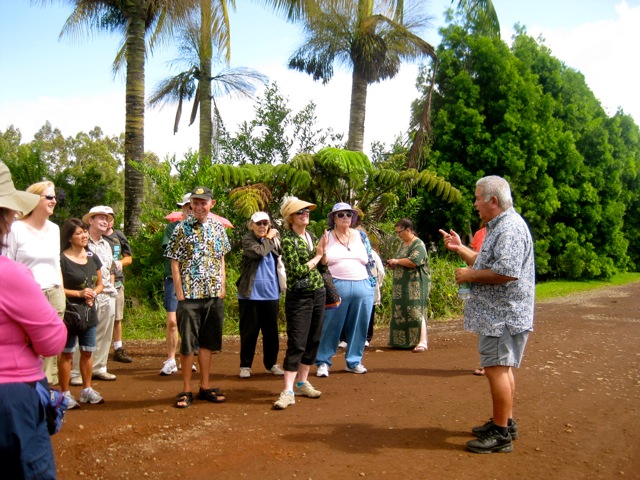My worlds collided on Saturday, when I led a tour that included a stop to meet Richard and see Hamakua Springs Country Farms.
Along with Hilo historian and anthropologist Judith Kirkendall, I lead van tours around East Hawai‘i. Right now we are doing a series of five tours that focus on agriculture and sustainability – what people are doing right now to be more sustainable, and how we can support them and also be more sustainable ourselves. The tours operate through Lyman Museum.
Our tour this past Saturday was called “The Garden As Provider,” and we focused on Hamakua. First we met at the Lyman Museum and heard a short talk by Sam Robinson about Let’s Grow Hilo. That’s the program she started that has volunteers planting edibles along downtown Hilo streets and in traffic medians.
“Anyone is free to help themselves to the fruit or vegetables once it’s ripe,” she told us, and she invited anyone interested in the project to come help plant and tend. They meet every last Sunday at the East Hawai‘i Cultural Center at 2 p.m.
Then we visited Barbara and Philip Williams, who live just outside Hilo near Pueopaku. Barbara grew up in Kenya, where they lived 50 miles away from the nearest railroad and so had to be self-sufficient. After she and Philip married, they lived on a plantation in East Africa. Now on the Big Island, they still grow and harvest everything they can. They have animals, including goats, and every fruit and vegetable you can imagine. “We retain the habits of being self-sufficient to the present day,” she told us.
From there we headed to Pepe‘ekeo, where Richard met us at Hamakua Springs.
Richard is such an interesting speaker. He told us the story of how he started in farming (after flunking out of UH and consequently serving in Vietnam, he returned home and helped his father on the family’s chicken farm; then traded chicken manure for banana keiki and started farming bananas). He talked about how they decided to move the farm to Pepe‘ekeo and why (hint: free water; the farm alone has one-third as much water as supports agriculture where 234,000 people live in Leeward O‘ahu). Our tour group was totally engaged.
He told about how he started noticing prices going up (on fertilizer, boxes, all the things they were using on the farm) and how he realized it was due to oil prices and decided to attend Peak Oil conferences to learn what was happening. And how he felt bad and so didn’t tell the others there that he would return to Hawai‘i and wear shorts throughout the winter, and grow his produce throughout the winter; nor how we have geothermal to provide us with energy – which we don’t even fully take advantage of.
He spoke about how he has been positioning themselves for how conditions will be five or 10 years from now, and about the hydroelectric project that is getting going on the farm very shortly, and how since his workers first asked to borrow money for gas to get to work he has started what they call the Family of Farms, working with nearby farmers. And about how they are experimenting with how they can produce protein on the farm by raising tilapia, and giving their workers fish (and produce) every week in lieu of monetary raises they cannot afford to give right now.
There was more, and as editor of this blog for all these years, none of it was new to me, but I, too, listened intently and enjoyed it thoroughly. It was fascinating to hear Richard pull all the pieces he talks about on this blog together into one, interrelated, narrative that tells such a real, on-the-ground story of how things are (and how they are changing). The people on the tour were really interested. We all were. Afterward, I heard people talking about what a great thinker he is, and how much they enjoyed meeting him.
That Richard, he’s all right!
We also went to Hi‘ilani Eco House in Honoka‘a, an amazing house being constructed to be as “green” as it gets. Wow, that’s a fascinating place (they say it should last for 500 years!) and they are very open to groups visiting, if anyone is interested. And we stopped a couple other places as well.
It was a neat day (the upcoming tours are listed here if you’re interested), and Richard’s information really made it so good. We were all wowed. Thanks, Richard!

